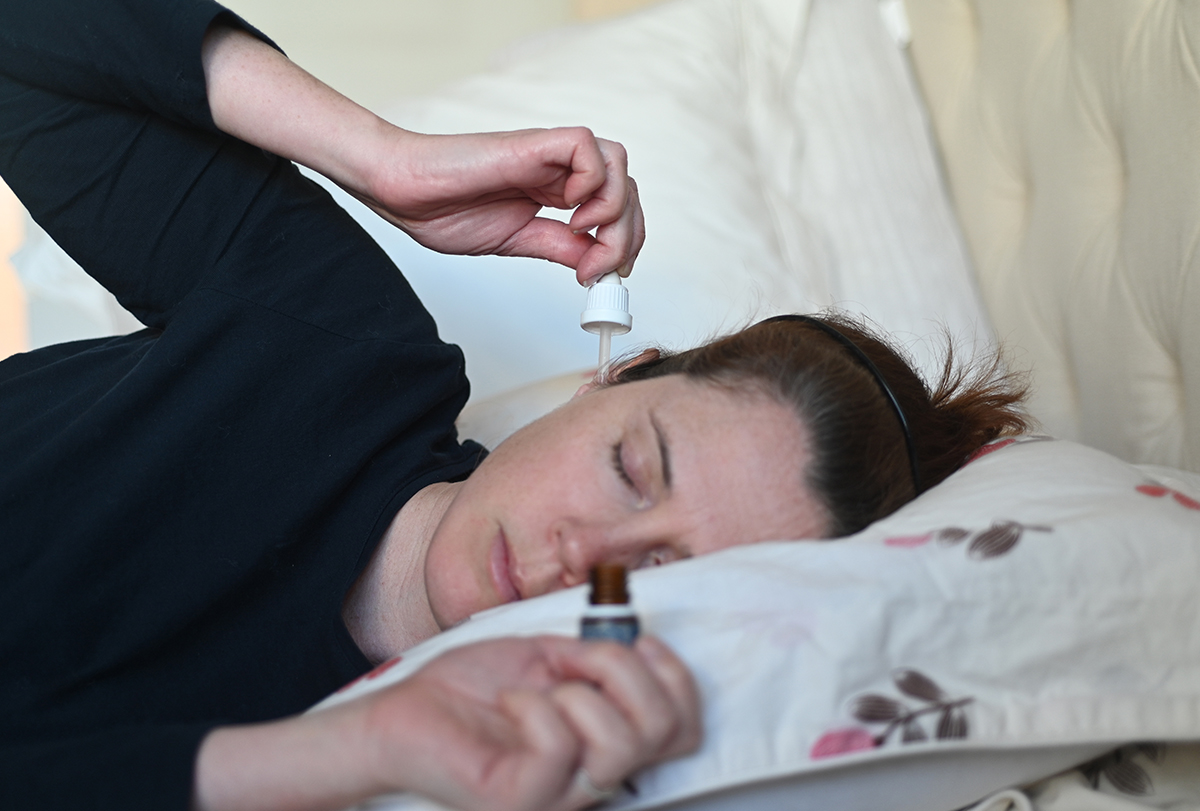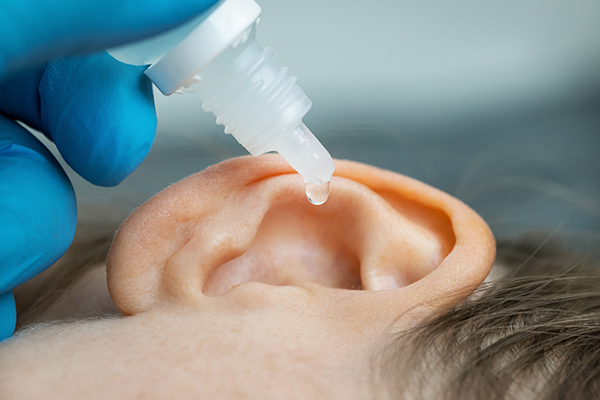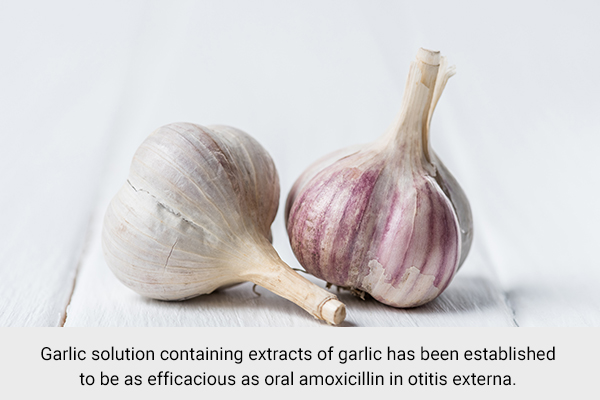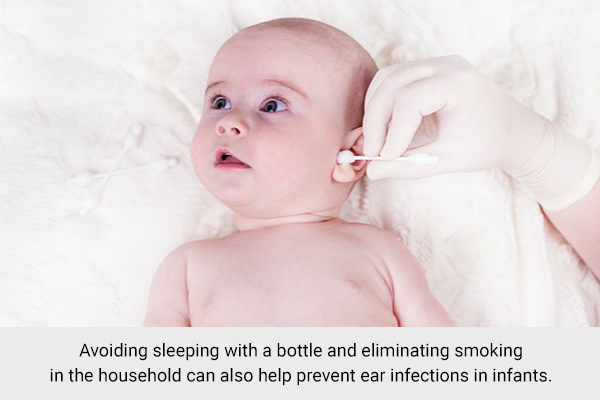In this article:
Swimmer’s ear is an ailment of the outer ear canal. It happens in the tube that attaches the opening of the ear to the eardrum. Doctors call it otitis externa.

Swimmer’s ear mainly occurs when water remains inside the ear canal after swimming, bathing, or showering. The moisture acts as a breeding ground for bacteria, which is the primary reason for an outer ear infection. It can also be induced by a fungus or virus, but this is rare.
Other causes comprise forceful cleaning of the ear canal, excessive use of headphones or hearing aids, and an allergy or irritation from accessories. (1)
For a mild infection, there are numerous easy home remedies that can curb the infection and aid in the healing of the ear canal.
Home Remedies for Swimmer’s Ear
Here are some natural remedies to provide relief from the swimmer’s ear.
1. Avoid getting water in your ears
Patients suffering from swimmer’s ear are urged not to put something into their ears or not to get them wet. They should also try to stay away from swimming and getting their heads wet.
Several specialists share straightforward methods for keeping water out of the ears including: (2)
- Using a soft plug in the ear canal to keep the water away
- Removing water from the ears after swimming or showering by leaning the head to the side or by shaking the head
- Using a hair dryer on a low setting to help remove water from ears
2. Perform vinegar irrigation of the affected ear 2–3 times a day

Research has identified an association between the severity of otitis externa and a change of pH. Therefore, recovery in pH is important for dealing with otitis externa.
The average pH level of a healthy ear canal was found to be 5.4 +/- 0.48, but it is slightly alkaline (pH increases) in cases of otitis externa. So, maintaining the right pH is important for treating otitis externa, and lowering the pH with vinegar irrigation can, therefore, be helpful.
Patients have reported improvement in their condition within 1–2 weeks of using this method for moderate to severe ear infections. (3)
How to use vinegar for swimmer’s ear:
- Mix identical quantities of white vinegar and rubbing alcohol in a bowl.
- Lie down on your side. Your infected ear should be up as you lie on the opposite side.
- Put 2–3 drops of the vinegar-alcohol solution into your ear using a dropper.
- Remain lying down for around 5 minutes.
- Get up and incline your head to let the solution come out of your ear.
- Perform this treatment 2–3 times a day.
Caution: It’s not recommended to use this method if you have any drainage from your ear or suspect a middle ear infection. If you experience any discomfort, discontinue its use.
3. Use hydrogen peroxide for your ears
Earwax, also known as cerumen, is produced by the body for the protection of the ears, but too much can contribute to swimmer’s ear.
Hydrogen peroxide is one of the primary products used to deal with swimmer’s ear because it has a strong cerumenolytic (breaks down earwax) activity. (4)
How to use hydrogen peroxide for swimmer’s ear:
- Lie down.
- Add 3–4 drops of 3% hydrogen peroxide into the affected ear using a dropper.
- Remain lying down for around 5 minutes.
- Tilt your head to permit the fluid to come out of your ear.
- Repeat a couple of times every day.
Caution: Applying an excessive amount of hydrogen peroxide can cause skin irritation inside the ear, leading to inflammation and ear pain. Avoid using ear drops if you have an ear infection or a ruptured eardrum.
4. Consider garlic

P. aeruginosa and S. aureus are the primary causes of swimmer’s ear. Other microorganisms such as K. pneumoniae, Escherichia coli, Streptococcus pyogenes, Staphylococcus epidermidis, and Candida species have also been seen in samples of otitis externa.
Garlic (Allium sativum) is a well-known herbal remedy as it has numerous health benefits, including antimicrobial activity. Garlic solutions containing extracts of garlic have been established to be as efficacious as oral amoxicillin in swimmer’s ear.
The antimicrobial action of garlic oil was seen to be promising against P. aeruginosa, Candida, and K. pneumoniae, showing that garlic can be useful in the management of swimmer’s ear. (5)
How to use garlic for swimmer’s ear:
- Grind a few garlic cloves.
- Mix them with 2 tbsp of olive oil.
- Heat the mixture until the garlic turns brown.
- Strain it and let it cool down.
- Put 2–4 drops of this oil in the infected ear.
- Do this at least once every day.
Caution: People with a tear or hole in their eardrum should avoid using garlic oil as a treatment for their ear issues.
5. Use basil juice drops
A study has found that basil oil has antimicrobial properties that can kill bacteria. In this remedy, vapors from basil oil are diffused from the external ear canal into the middle ear to provide an antimicrobial effect on swimmer’s ear.
Treatment with basil oil has been found to improve the condition, leading to faster healing. (6)
How to use basil for swimmer’s ear:
- Extract the juice of 4–5 basil leaves.
- Heat the juice a little till it is lukewarm.
- Put 2–3 drops of basil juice into the infected ear.
- Wait for around 5 minutes.
- Drain the fluid by tilting your head.
How to Prevent Swimmer’s Ear?

To prevent swimmer’s ear, it’s important to avoid getting water or shampoo inside your ear by using earplugs or tilting your head after swimming, as well as treating conditions such as eczema that can increase the risk of infection.
Additionally, not letting your baby sleep with a feeding bottle and eliminating smoking in the household can help prevent ear infections in infants. Others recommend avoiding cotton swabs because they might affect the cerumen.
Daily prevention with alcohol or acidic drops when performing activities that may cause a swimmer’s ear is vital.
Also, the use of hard earplugs should be bypassed because they can result in trauma. (2)
Most-Asked Questions About Swimmer’s Ear
How do I get swimmer’s ears from swimming?
Swimmer’s ear can occur when moisture or water remains in the ear canal for extended durations, providing a perfect environment for germs to grow and infect the skin. These germs are found in pools and other places you swim.
Can a swimmer’s ear spread from one person to another?
The Centers for Disease Control and Prevention (CDC) verified that swimmer’s ear cannot be spread from one person to another.
Are ear infections caused by bacteria and viruses?
Both bacteria and viruses can cause ear infections.
Does smoking make ear infections worse?
Healthcare professionals do suggest a possible connection between smoking and ear infections.
Is it true that breastfeeding helps with ear infections in babies?
Experts do suggest that antibodies found in breast milk lower the rate of ear infections in babies.
Final Word
Swimming can lead to an outer ear infection because water usually is left inside the ear canal, which can be a breeding ground for bacteria.
An infection can also occur due to an injury to the ear canal or excessive scratching. In fact, the continuous wearing of headphones or the use of cotton buds can also result in outer ear infections. One such ailment is swimmer’s ear or otitis external.
In mild cases, it can be controlled using home remedies. In severe cases, a doctor’s attention is needed.
 Continue ReadingWhat Is Swimmer‘s Ear and How to Deal With It
Continue ReadingWhat Is Swimmer‘s Ear and How to Deal With It
- Was this article helpful?
- YES, THANKS!NOT REALLY


